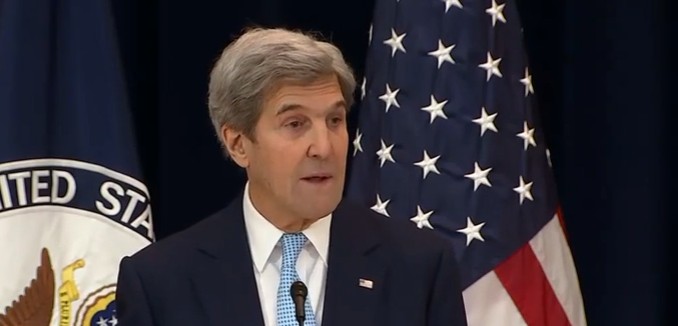In a more than hour-long speech Wednesday, U.S. Secretary of State John Kerry laid out six “principles” for what he believed a just and successful two-state solution to the Israeli-Palestinian question would look like.
In doing so, he also pledged that while other countries might support a unilateral move toward Palestinian statehood at the United Nations Security Council, “these are not the choices that we will make.”
The first and likely most controversial principle was that the borders of Israel and Palestine should be based on the 1949 armistice lines with mutually-agreed border swaps. President Barack Obama made similar statements in 2011 about the armistice lines and land swaps being an agreed-upon basis for negotiation, which led to criticism that doing so undermined Israel’s bargaining position. Because the Old City of Jerusalem is behind those lines, “the very idea that Judaism’s holiest shrine is alien or that Jerusalem’s Jewish Quarter is rightfully or historically or demographically Arab is an absurdity,” Charles Krauthammer wrote in The Washington Post at the time. “And the idea that, in order to retain them, Israel has to give up parts of itself is a travesty.”
Kerry’s other principles were:
• Fulfilling “the vision of the UN General Assembly Resolution 181 of two states for two peoples, one Jewish and one Arab, with mutual recognition and full equal rights for all their respective citizens”;
• A solution to the Palestinian refugee issue;
• “Provide an agreed resolution for Jerusalem as the internationally recognized capital of the two states, and protect and assure freedom of access to the holy sites consistent with the established status quo”;
• Provide for Israel’s security needs while ensuring Palestinian sovereignty in a non-militarized state;
• Ending all outstanding claims and establishing normalized relations.
Kerry also defended the Obama administration’s controversial decision last week to refrain from vetoing United Nation Security Council Resolution 2334, which condemned Israeli settlement activities in the West Bank and eastern Jerusalem. Kerry said that the move, which was opposed by many top Democratic politicians, was necessary to preserve the “dream of a Jewish-Democratic state of Israel, living in peace and security with its neighbors.”
The speech criticized Palestinian incitement and terrorism, and said that Palestinian attacks on Israeli civilians inhibited Israelis’ belief in a peace agreement. But the reason Kerry most frequently stated for the lack of peace was the building of communities in territories that Israel captured in 1967.
Kerry claimed that the United States has called on the Palestinian Authority to “strengthen their own institutions and to improve governance, transparency, and accountability.” However, Walter Russell Mead of Bard University and the Hudson Institute observed earlier this week that both Fatah, which rules the West Bank, and Hamas, which rules the Gaza Strip, “depend on foreign paymasters to cover their expenses; neither has shown much ability to build a real state or to solve the problems of the Palestinian people.”
In response, Israeli Prime Minister Benjamin Netanyahu made a televised speech of his own, calling Kerry’s remarks “a big disappointment” and criticizing him for drawing a “false moral equivalence” between Palestinian terror attacks and construction in Jerusalem.
[Photo: FOX 10 News / YouTube ]




